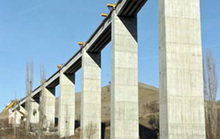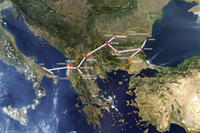
Unfinished railway bridge in Macedonia
Just before the start of the electoral campaign, Macedonian prime minister Gruevski announced a massive plan to invest in infrastructures. Little resources, though, seems to have been allocated to revive the "European Corridor 8", meant to link the Adriatic to the Black Sea
One day before the official start of the campaign for the local and presidential elections scheduled for 22 March, Prime Minister Nikola Gruevski publicly stated his government would spend eight billion euros on capital investment over the next eight years. The money, the government said, would be spent primarily on building roads and power plants.
Some economic experts promptly said this was not possible. Others cynically commented that the project "exceeded even the wildest dreams". One economic commentator said people in the government must be "taking substances" to be able to produce such projections.
Yet, the government seemed serious in its plan. Prime Minister Gruevski said he was well aware the plan is very ambitious and that he would be content "even if only two-thirds of it were accomplished."
Approximately half of the eight billion would go for transport infrastructure, such as roads and railways, and the other half for power plants. The government said that a smaller share of the overall amount would come from the budget, part would be borrowed from international financial institutions (IFIs), and a large portion would come through concessions and public-private partnerships. Big foreign companies would be given the opportunity to build a road, or a power plant, and they would subsequently be entitled to operate them and collect the profits.
An agreement of this type was recently signed with a large Turkish company TAV, which leased two Macedonian airports. TAV will operate the airports over the next 20 years, and in exchange, within two years must invest around 200 million euro in both the existing airports' modernization and the construction of a new cargo airport in Stip.
The deal seems very good, if one sees the Skopje airport, pretentious named "Alexander the Great" but easily mistaken for a dusty, provincial bus station. TAV operates several airports in Turkey including one in Istanbul and several more in other countries.
Alas, the deal was signed amid the breakout of the financial crisis, and has already been postponed.
Macedonia's need for infrastructure investment is not under dispute. The country, a crossroad for two major European Corridors, 8 and 10, currently has only 240 kilometres of motorway, including the recently completed 26 kilometres of ringroad around Skopje.
At the same time, electrical power is one of Macedonia's major imports.
The planned infrastructure investment should ideally reduce the country's dependency on foreign-produced energy, and help complete the major public works waiting for decades. Achieving these two goals should boost the small economy.
From Macedonia, other locations in the Balkans are close, yet far away. A trip from Skopje to Dubrovnik, which could ideally take four to five hours of easy ride, currently requires 10 hours of circuitous travel through the Kosovo and Montenegrin mountains. This would improve when the famous Corridor 8 would eventually be finished.
The east-west Corridor 8 links Burgas on the Black Sea with Duress on the Adriatic and will pass via Skopje and Tirana.
In Macedonia, this project has been more or less on standby for decades. Recently, the project's most discussed aspect has been the railroad to Bulgaria.
At this time, Macedonia's odd absence of a rail (or motorway) connection to Bulgaria dramatically impedes trade. This lack of modern transportation connections partially results from communist times, when Yugoslavia and Bulgaria were divided by Yugoslavian-Soviet Bloc rivalries.
Early in the 1990s, the Macedonian government placed a high priority on a railroad to Bulgaria. When the project began, completion within a year was promised. Some 15 years later, the rail project has still not been finished.
After years of works, the only visible results are several large unfinished bridges. According to some experts, starting and stopping of the construction work has added substantially to the project's cost.
After years of dilemmas and no answers to why the railroad had not been completed, the simple response may be that the country does not have the capacity to complete the work. Practically all big Macedonian construction companies participated in the project over the years; some sued the government over its failure to fulfil commitments. Successive governments could not even directly estimate the project's cost.
The early estimate of 100 to 200 million USD (before the euro existed) increased to about three or four times that amount. In a visit in 2008 to Kriva Palanka (a town near the border with Bulgaria), Prime Minister Gruevski and Minister of Transport Mile Janakievski stated that around 400 million euros would be needed to complete the rail section of Corridor 8 (including also the smaller link with Albania). According to estimates, more than 100 million euros has been invested in the project.
However, the project is only a small item in the sizeable government budget planned for capital investment in 2009. According to different media reports and expert analyses, only around 10 million of an estimated 500 million euros for investment are currently allocated to the railroad. According to some experts, this is very little. "It is about the price of one railroad bridge," says the director of a large construction company.
Despite the rhetoric about the high priority of Corridor 8, higher priority will be given to other projects.
Currently, a World Bank loan will help the government spend about a 100 million euros in 2009 on reconstructing local and regional roads. Work should also be done on a remaining section of Corridor 10.
The government has few public resources for investment, but must either borrow or rely on private investors with their own preferences and priorities for funding. Moreover, private investors lately have been stretched thin.
Spending on capital investment is good. In any case, these expenditures are far better than spending on the oversized and ineffective public administration. Macedonia is a moderately indebted country that can borrow. What remains to be seen is whether the government really has the capacity for capital investment or if this infrastructure plan is just another election-year promise.







 To Top
To Top